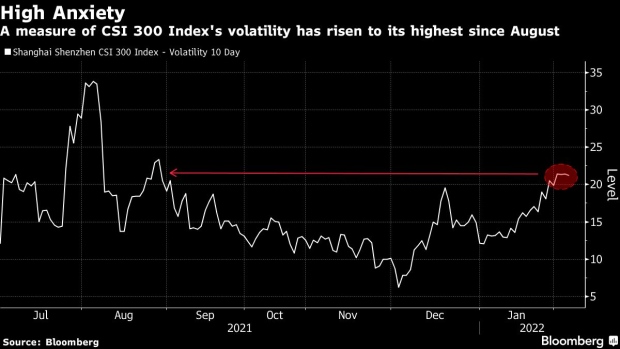Feb 11, 2022
Angst Grows for Global Funds Seeking a Floor in China Stocks
, Bloomberg News

(Bloomberg) -- Intervention by state funds and cheapening valuations for Chinese stocks after they plunged into a bear market are not proving enough to calm nerves for some global money managers.
BNP Paribas Asset Management, Mobius Capital Partners LLP and GAM Investment Funds SA remain cautious about mainland stocks, according to interviews with fund managers at the firms this week.
That’s even as the CSI 300 Index is trading near its cheapest price-to-earnings valuation since mid-2020 after having plunged into a bear market at the end of last month. It has lost nearly 7% this year so far, the second worst among Asian stock benchmarks behind South Korea’s Kospi.
“I would prefer to wait” for valuations to drop further to multi-year lows, said Jian Shi Cortesi, a portfolio manager at GAM Investment Management in Zurich.
Some signs of optimism emerged as intervention by China’s “national team” of state-backed funds helped the CSI 300 advance this week, but questions remain over whether this could last. Concerns over a slowing economy, Covid-19 and the property sector’s debt woes have so far outweighed all positives, from a likely peak in Beijing’s regulatory onslaught to the divergence in monetary policy between China and the U.S.
Veteran fund manager Mark Mobius said China’s monetary easing is a “sign of desperation” to get growth on track after regulatory crackdowns and its effect will come with a lag. Mobius Capital is investing new money in India and Taiwan.
“We are still holding China but our big holdings now are India and Taiwan” due to their earnings outlook, said Mobius, who set up the firm after more than three decades at Franklin Templeton Investments.
China’s CSI 300 Index is trading at 13.4 times next 12-month earnings, near the lowest since June 2020 but still higher than its five-year average of 12.7, according to Bloomberg-compiled data.
While China’s valuations are “reasonable,” Jessica Tea, an investment specialist of BNP Paribas Asset, says she is focusing more on hardware stocks in Korea and Taiwan, consumer equities in India and Southeast Asia, and on financials in Singapore and Hong Kong because of better earnings visibility.
Meanwhile, volatility is rising for the CSI 300, whose 0.8% gain this week came after a 4.5% plunge in the five days before the Lunar New Year holidays. A measure of its 10-day swings has risen to the highest in nearly six months.
READ: Chinese Tech Firms Ramp Up Share Buybacks in Bid to Halt Rout
Volatility will continue, said Hao Hong, chief strategist at Bocom International. Valuations are just “too high” in some parts of the mainland market.
©2022 Bloomberg L.P.


